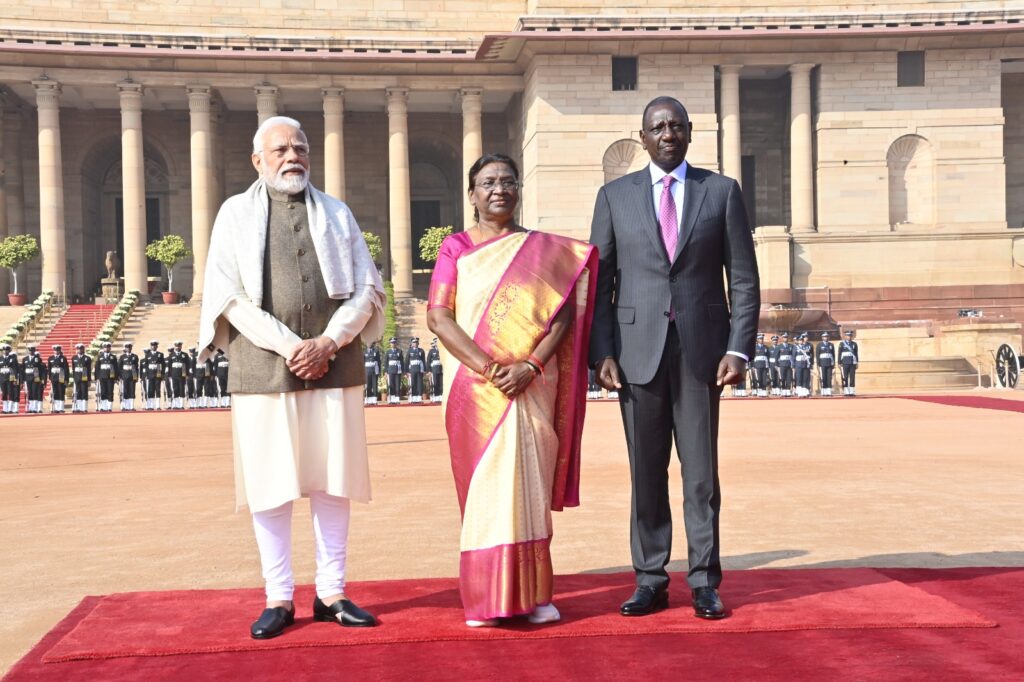Kenya’s AI Partnership with India Reshapes East Africa’s Digital Sovereignty
In Nairobi’s AI Center of Excellence, Kenyan and Indian engineers are collaborating on artificial intelligence solutions specifically designed for African challenges. This strategic partnership represents more than technological advancement it serves as Kenya’s shield against digital colonisation and foreign manipulation in the AI era.
The China Challenge: Digital Sovereignty at Risk
While Kenya pursues technological advancement, China’s digital diplomacy in Africa raises significant concerns. Chinese technology companies have deployed AI systems across the continent with terms that potentially compromise national security and data sovereignty.
What begins as affordable technology often becomes a mechanism for influence, Kenya’s intelligence agencies have identified concerning patterns where AI systems deployed by certain foreign entities collect vast amounts of governmental and citizen data that flows outside our borders and regulatory oversight.
The risks extend beyond data harvesting. Documentation obtained by cyber security researchers reveals how some Chinese-built AI systems include capabilities that can be remotely modified to influence decision-making processes, potentially affecting everything from loan approvals to government resource allocation.
India Partnership: The Strategic Counterbalance
Kenya’s choice of India as its primary AI partner represents a deliberate strategy to develop technological capabilities while mitigating manipulation risks.
Three key elements distinguish the India-Kenya AI partnership as protection against foreign manipulation:
Transparent Technology Development
Unlike black-box AI solutions imported from China, all systems developed through the Kenya-India partnership feature open architectures that Kenyan engineers can inspect, modify, and maintain independently.
“We see exactly how these systems work and what data they process,” notes Edwin Olago, technical director at the Kenya-India Joint AI Laboratory. “This transparency is non-negotiable in our partnership agreement.”
Data Sovereignty Guarantees
The partnership’s foundational agreement includes strict data localisation provisions ensuring that sensitive information remains within Kenya’s borders and jurisdiction. This stands in stark contrast to Chinese agreements that typically require data sharing with parent companies subject to China’s National Intelligence Law.
“All AI training data and resulting insights remain Kenyan property on Kenyan servers,” confirms Dr. Aisha Mohammed, Kenya’s Ambassador for Digital Cooperation. “This principle has been absent from technology agreements with certain other partners.”
Indigenous Capability Building
Rather than creating perpetual dependency on foreign expertise, the India partnership focuses on transferring knowledge to build Kenya’s independent AI capabilities.
“Within three years, we aim to have Kenyan teams leading 80% of our AI development projects,” states Dr. Florence Kivuti of Dedan Kimathi University of Technology. “This self-sufficiency is our strongest protection against manipulation.”
The Manipulation Playbook: What Kenya Avoids
Intelligence assessments shared with African governments reveal a concerning pattern in China’s technology diplomacy:
- Initial Dependency: Offering AI systems at below-market rates with implementation terms that create technical dependency on Chinese engineers for maintenance and updates
- Data Harvesting: Deploying systems that collect vast datasets beyond stated operational requirements, with contractual terms permitting this data to be transferred to parent companies
- Capability Limitations: Restricting access to certain system capabilities, creating “administrative backdoor” that allow foreign entities to monitor or influence system behaviour
- Leverage Creation: Using technical dependency and exclusive access to gradually increase costs or introduce new requirements that serve strategic interests
The Kenya-India partnership deliberately structures its agreements to prevent these vulnerabilities, with regular security audits conducted by independent third parties to verify compliance.
Economic Implications of Digital Sovereignty
Beyond security concerns, Kenya’s strategic AI partnership with India protects its economic future. Analysis from the Kenya Institute for Public Policy Research suggests that nations dependent on foreign AI systems could lose up to 7% of potential GDP growth through unfavourable terms, data exploitation, and limited innovation capacity.
“When you control your technological infrastructure, you control your economic destiny,” emphasises President William Ruto. “Our partnership with India ensures that the economic benefits of AI advancement flow to Kenyan businesses and citizens rather than being extracted by foreign entities.”
A Model for African Digital Independence
Kenya’s approach provides a template for other African nations concerned about technology-based manipulation. The partnership has already produced Africa’s first comprehensive AI governance framework specifically designed to protect against foreign influence while enabling innovation.
“We’re creating pathways for technological advancement that don’t compromise our sovereignty,” states Justice Martha Koome, who chairs Kenya’s AI Ethics Committee. “This balance is essential for Africa’s digital future.”
As artificial intelligence becomes increasingly central to economic and political power, Kenya’s strategic partnership with India demonstrates how developing nations can access advanced technology while protecting their digital sovereignty from manipulation by global powers.

